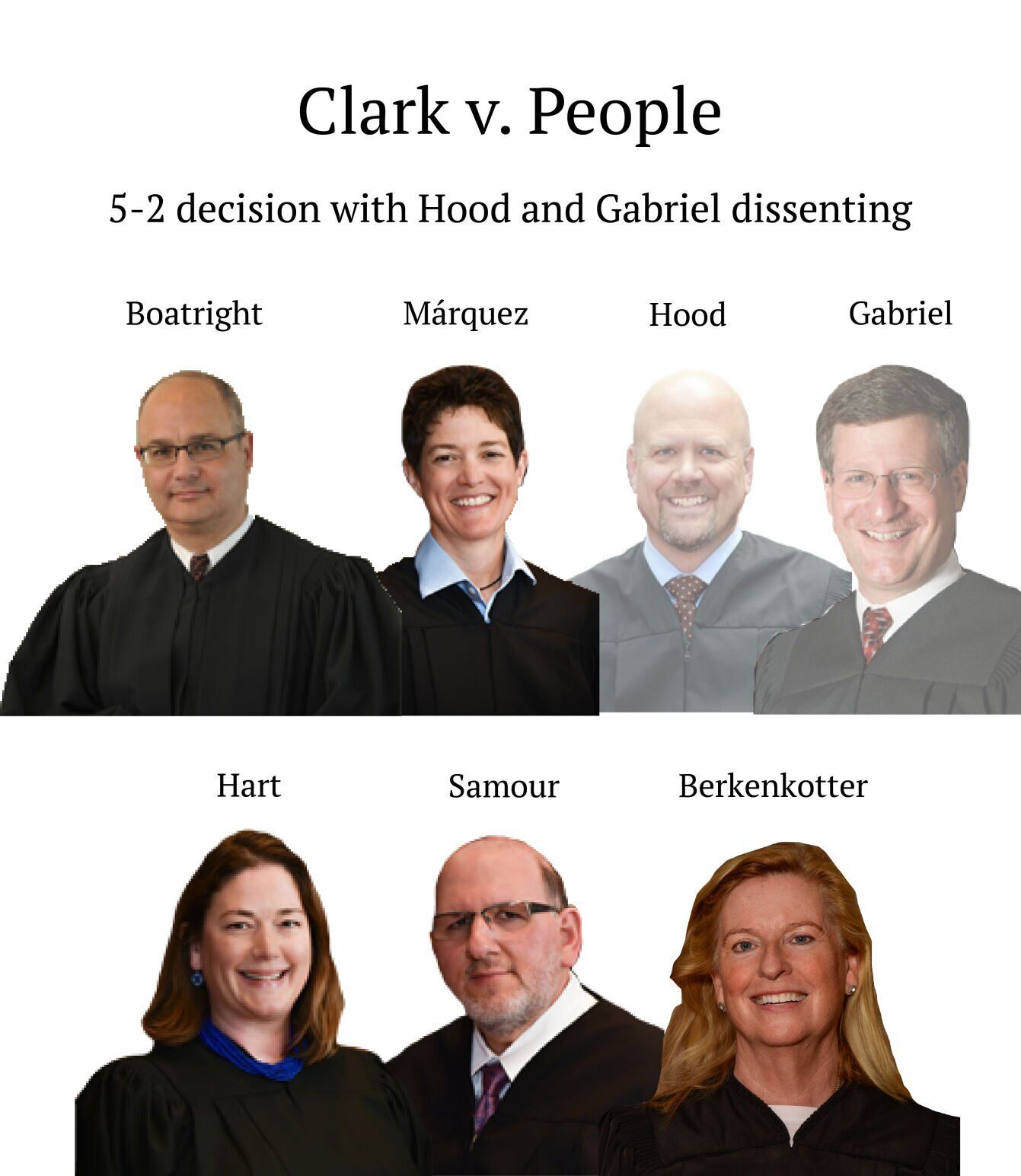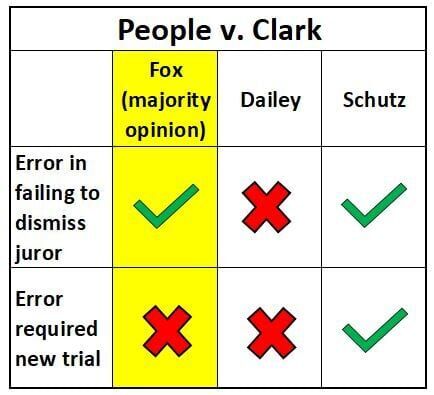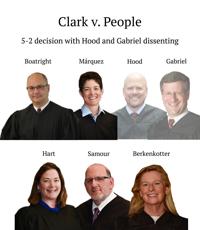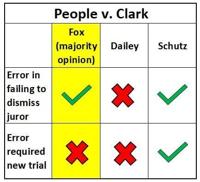Colorado Supreme Court, 5-2, says no new trial following ‘overt, in-court racism’
U3VwcmVtZSBDb3VydCBKdXN0aWNlIE1vbmljYSBNLiBNw6FycXVleiBzbWlsZXMgZHVyaW5nIGEgc3dlYXJpbmctaW4gY2VyZW1vbnkgZm9yIHRoZSBmaXJzdC1ldmVyIGNsYXNzIG9mIGxpY2Vuc2VkIGxlZ2FsIHBhcmFwcm9mZXNzaW9uYWxzLCBhIG5ld2x5IGF1dGhvcml6ZWQgb2NjdXBhdGlvbiBhbGxvd2VkIHRvIHByYWN0aWNlIGxhdyB0byBhIGxpbWl0ZWQgZXh0ZW50LiBUaGUgTExQcyB0b29rIGFuIG9hdGggb2Ygb2ZmaWNlIGluIHRoZSBDb2xvcmFkbyBTdXByZW1lIENvdXJ0J3MgY291cnRyb29tIG9uIFRodXJzZGF5LCBKdW5lIDIwLCAyMDI0LiAoU3RlcGhlbiBTd29mZm9yZCwgRGVudmVyIEdhemV0dGUp
U3RlcGhlbiBTd29mZm9yZCBUaGUgR2F6ZXR0ZQ==
The Colorado Supreme Court concluded on Monday that a Black defendant did not deserve a new trial after one juror disclosed he moved to the overwhelmingly White jurisdiction because he “didn’t want diversity,” and the trial judge refused to dismiss him for bias.
By 5-2, the court believed Reginald Keith Clark had not shown the juror’s comments, ostensibly conveying prejudice against people of color, had harmed him. Even though the trial judge allowed the man — identified as Juror K — to remain, the defense later removed Juror K using one of its strikes and there were no further allegations Clark’s actual jury was biased against him.
“Ultimately, the only events the jurors witnessed were Juror K’s comments during (jury selection) and Juror K’s subsequent dismissal,” wrote Justice Monica M. Márquez in the July 1 opinion. “If there was any reasonable conclusion to draw about the permissibility of racial bias in the courtroom, it was that such expressions of bias result in dismissal, not that they are tolerated or welcomed.”

FILE PHOTO
Colorado Politics file photos

FILE PHOTO
Justice William W. Hood III dissented, arguing the “overt, in-court racism” should have resulted in Juror K’s dismissal for cause. Writing for himself and Justice Richard L. Gabriel, Hood suggested the majority was “no doubt reluctantly” upholding Clark’s convictions. But he believed allowing a juror to make biased comments against the only Black person in the courtroom, and then keeping him in the jury pool, damaged the integrity of the justice system in immeasurable ways.
“The ruling itself was clear: Even after expressing racial bias, Juror K was fit to serve,” Hood wrote. “The district court placed an aura of legitimacy around Juror K’s racial bias by failing to condemn it, and in turn, introduced the risk that sitting jurors may have felt comfortable — or worse, empowered — to make judgments rooted in bias.”
“There is nothing harmless about allowing racism to infect the jury selection process,” added the ACLU of Colorado in a statement. The group had submitted a brief to the Supreme Court in support of a new trial for Clark.
‘A political view, I think’
Clark’s case and the unique sequence of events during jury selection previously fractured the state’s second-highest court. Although the Court of Appeals agreed to uphold Clark’s convictions, the three judges on the panel that heard the case were unable to fully agree about what to do.
A Gilpin County jury convicted Clark of kidnapping a woman from Denver, driving her to the mountains near Black Hawk and sexually assaulting her. During voir dire — the part of jury selection where attorneys ask questions of jurors — Clark’s attorney raised the fact that Clark was the only Black person in the room. Some jurors acknowledged that from Clark’s perspective, he “might have some reservations” about whether he would receive a fair trial in Gilpin County, which is 92% White.
Juror K then volunteered his thoughts about the issue of diversity.
“Yes, it’s obvious there’s a Black gentleman over there. This is Gilpin County. I moved to Gilpin County. I didn’t want diversity,” he said. “I hear the things, that diversity makes us stronger and things like that. I don’t quite believe it in life from what my personal experiences are. And I can’t change that.”
After the parties spoke with then-District Court Judge Dennis J. Hall, the judge asked Juror K if he could perform his duties based on the evidence. Yes, Juror K responded. Although the defense moved to dismiss Juror K for cause, Hall denied the request.
Juror K expressed “a political view, I think,” Hall elaborated. “That doesn’t really answer the question of whether he can be a fair juror. And a person can certainly have offensive views and still apply the law.”
The defense later removed Juror K using one of its allotted strikes, and he did not serve on the jury.
On appeal, the question was whether Hall improperly handled the challenge to Juror K and, if so, whether Clark deserved a new trial. In an unusual decision, the Court of Appeals panel issued three separate opinions, one for each judge.
Judges Terry Fox and Timothy J. Schutz believed Hall should have dismissed Juror K for cause because of his admitted racial bias. But then-Judge John Daniel Dailey believed Hall did not make a mistake and that nothing warranted a reversal of Clark’s convictions. On that final point, Fox agreed with him, forming a 2-1 majority to uphold Clark’s convictions.
Only Schutz felt the error was structural in nature — meaning Juror K’s continued presence in the jury pool affected the fundamental fairness of Clark’s trial. Schutz argued bluntly, “there is no acceptable level” of racism in jury selection.
“The decision to permit a racially biased prospective juror to continue on the panel spoke not only to Clark, but also to the greater community,” he wrote. “The message sent was that a prospective juror could sit in judgment of a person against whom he had an acknowledged racial bias.”


No harm? Or insidious harm?
Márquez, writing for the Supreme Court’s majority, cautioned that legal precedent did not support a new trial where a biased juror does not ultimately sit on the jury. Further, any error by Hall in retaining the prejudiced juror was in “good faith.”
That is “not to say it is unimportant or inconsequential” what happened to Clark, she added. But “tolerating” Juror K’s continued service on the jury until he was dismissed did not amount to unconstitutional discrimination.
Hood, in dissent, would have declined to strictly abide by the court’s precedent and instead conclude Schutz was right about the threat to the fairness of Clark’s trial. A former trial judge himself, Hood believed it would have been clear to the other jurors that Juror K revealed something problematic and the trial judge was OK with it.
“In my experience … jurors aren’t as naive as my colleagues in the majority suggest,” he wrote. “I agree with Judge Schutz that what occurred during voir dire offends Clark’s equal protection right to be free from state-approved racial discrimination.”
The court also rejected Clark’s other argument that one juror’s alleged comments about her prior jury service pressured some of Clark’s other jurors into convicting him. The justices determined such commentary was not improper outside information.
The case is Clark v. People.






